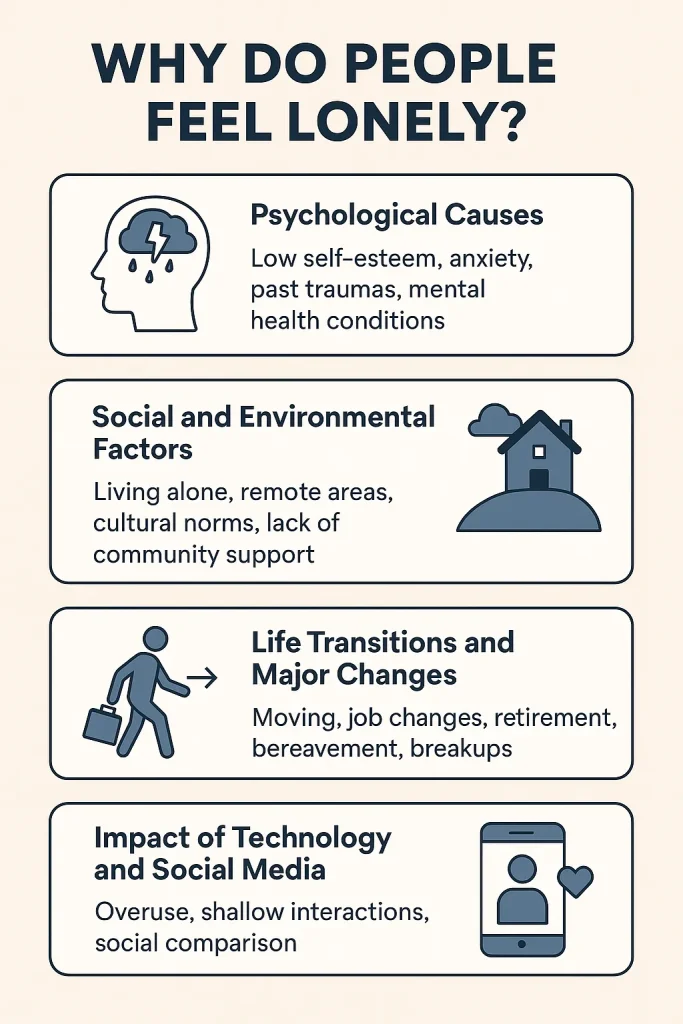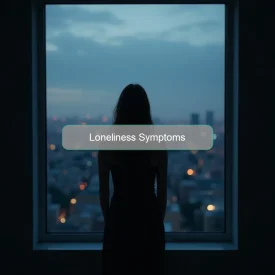On a global scale, about 1 in 6 people experience loneliness. Feeling lonely is an emotional state where you sense a disconnect between your need for social connection and what you’re actually experiencing. This distress can hit anyone, regardless of how many people are around you.
Experts define loneliness as a painful awareness of lacking meaningful relationships. It often stems from unmet social needs, leading to feelings of isolation even in a crowd.
Key Takeaways:
- Loneliness isn’t just being alone—it’s the pain of lacking meaningful connections.
- Small, regular actions like reaching out to friends, picking up hobbies, or volunteering can ease isolation.
- Digital tools such as support groups, mental health apps, and AI companions offer extra help when face-to-face contact is limited.
- Life changes like moving or breakups often cause loneliness, but awareness helps manage it.
- Seek professional help if loneliness becomes chronic or disrupts your daily life.
What Does “Feeling Lonely” Really Mean?
“Feeling lonely” means feeling unhappy or uncomfortable because you think you are alone or disconnected from others, even if there are people around you. It is a personal experience that depends on how much connection and closeness you expect or need from others.
Unlike being alone by choice or solitude, which can feel peaceful and positive, loneliness is an unpleasant feeling that you don’t want and that makes you feel isolated and emotionally upset.
Practical Ways to Cope With Feeling Lonely
Begin with small steps to create positive change. Simple actions, done regularly, can gradually reduce feelings of loneliness and help you feel better over time.
Focus on things you can control, like reaching out to others or trying new hobbies, rather than worrying about what you can’t change.

Strengthening Social Connections
Strong social connections boost your happiness and help ease loneliness. Here are some ways to build and maintain your social ties:
- Reach out to old friends via calls or messages to rekindle ties.
- Join local groups or events to meet like-minded people.
- Nurture relationships by scheduling regular catch-ups.
- Volunteer for community activities to meet new people and give back.
- Use social media carefully to stay in touch without feeling overwhelmed
Pursuing Hobbies and Interests
Engaging in activities you enjoy can lift your mood and reduce loneliness. Consider trying:
- Activities like reading, painting, or gardening that you find relaxing and fun.
- Joining classes or clubs related to your interests for social perks.
- Exploring new hobbies to discover talents and meet others with similar passions.
- Attending workshops or group events that encourage teamwork and connection.
Volunteering and Helping Others
Volunteering helps by shifting your focus away from yourself and giving you a sense of purpose. When you help out at shelters, community events, or other local projects, you connect with others in meaningful ways.
This not only reduces feelings of isolation but also creates a sense of belonging and community. Volunteering can boost your mood, improve your self-confidence, and help you build new friendships—all of which make it easier to feel connected and cared for.
Plus, having regular volunteer activities can bring structure and routine to your life, which supports your overall well-being.
Practicing Self-Compassion and Mindfulness
Being kind to yourself means accepting your feelings without being hard on yourself. When you feel lonely, remind yourself that it’s normal to feel this way sometimes.
Mindfulness activities like meditation or deep breathing help you stay calm and stop worrying too much. Doing these things every day can make you stronger and better able to handle lonely moments.
Setting Healthy Boundaries
It’s also important to set healthy limits with others. Saying no to people or situations that make you feel tired or upset helps protect your feelings.
Good boundaries keep your relationships fair and caring. When your relationships feel good and balanced, you’re less likely to feel lonely.
Overcoming Loneliness in Specific Situations
Overcoming loneliness works best when you adjust your approach to fit your own situation. It’s important to understand what specific things make you feel lonely, as these triggers can be different for everyone.
Once you know your triggers, look for support and activities that suit your particular needs, whether that’s joining a group, talking to a counselor, or finding new hobbies.
Tailoring your strategies this way helps you feel more connected and makes it easier to manage loneliness.

Feeling Lonely in a Relationship
Feeling lonely in a relationship can happen when you feel emotionally disconnected from your partner, even if you are physically together. It’s important to communicate openly about your feelings and needs so you both understand each other better.
Doing activities together or seeking couples therapy can help rebuild closeness and strengthen your bond, reducing feelings of loneliness.
Loneliness After a Breakup
Loneliness after a breakup often feels intense because of the grief and loss you experience. Allowing yourself time to heal is essential, and leaning on friends for support can provide comfort.
Creating new routines and focusing on your own growth will gradually help you fill the void and move forward from the loneliness.
For more in-depth guidance on coping as a single person, see our article, Single and Lonely: Understanding, Coping, and Thriving in Solitude.
Loneliness in a New City
Feeling lonely in a new city is common because moving disrupts your social networks and familiar surroundings. Trying local meetups or newcomer apps can help you connect with others.
Developing habits like going to the gym or visiting cafes regularly can build a sense of routine and community, easing feelings of loneliness.
For me, moving to a new city made loneliness feel intense until I joined a hiking group. At first, every evening felt isolating, but gradually, building a small routine and meeting like-minded people turned that isolation into a sense of belonging.
Coping With Loneliness as a Senior
Coping with loneliness as a senior can be challenging due to losses from retirement or bereavement. Joining senior centers where you can participate in activities offers companionship and social support.
Using technology like video calls helps you stay connected with family and friends, which lessens feelings of isolation.
Loneliness in the Workplace
Loneliness in the workplace has increased with remote work, leading to fewer casual interactions. To feel less lonely, try initiating virtual coffee chats with colleagues or joining team-building activities.
Attending after-work events can also help you reconnect with coworkers and build stronger relationships, reducing work-related loneliness.
Explore more coping strategies and ways to find support in our guide on dealing with loneliness.
Digital Tools and Resources to Combat Loneliness
Digital tools and resources can help bridge the gap when meeting people in person isn’t possible. Choosing tools that fit your comfort level is important, so you don’t feel overwhelmed.
Online Support Groups and Communities
Online support groups and communities, like those on Reddit or Facebook, connect people who share similar experiences. You can share your story anonymously and receive empathy from others who understand. Regularly joining these groups helps you build virtual friendships and feel less alone.
Mental Health Apps
Mental health apps offer a helpful way to manage loneliness by guiding you through exercises that boost your mood and well-being. They often include features like mood tracking, personalized tips, and interactive tools to support your mental health.
Many apps also focus on mindfulness and relaxation techniques to help you stay present, reduce stress, and calm anxious thoughts, making it easier to cope with feelings of loneliness.
AI Companions and Digital Friends
AI companions are a new type of digital helper designed to provide companionship anytime you need it. These AI friends can chat with you and offer social interaction when human contact is limited.
For more, check out AI girlfriends and learn about the benefits in this What is an AI girlfriend blog.
Why Do People Feel Lonely?
People feel lonely for different reasons, often a combination of many factors. Understanding these causes can help prevent loneliness and find lasting relief.
According to Dr. Julianne Holt‑Lunstad, a psychology professor at Brigham Young University, prolonged social isolation is strongly linked to higher risks of mental and physical health issues—including depression, anxiety, and early mortality. Loneliness is therefore a serious public health concern.
Her research, including a landmark meta-analysis, shows that loneliness increases the risk of early mortality by 26%, while social isolation raises it by 29% and living alone by 32%.

Psychological Causes
Loneliness can stem from psychological causes such as low self-esteem, anxiety, and past traumas that make trusting others difficult. Mental health conditions can also increase feelings of loneliness, making it harder to form and maintain connections.
Social and Environmental Factors
Social and environmental factors play a big role, too. Living alone, especially in remote areas, can cause isolation.
Cultural norms or the stigma around showing vulnerability may prevent people from reaching out. A lack of community support also adds to the feeling of being alone.
Life Transitions and Major Changes
Life transitions and major changes like moving to a new place, changing jobs, or retiring can disrupt daily routines and social networks, leading to loneliness.
Bereavement or breakups especially trigger intense feelings of loss, and adjusting to these changes takes time and effort.
Impact of Technology and Social Media
Technology and social media have mixed effects—while they can connect people, overuse often leads to shallow interactions.
Comparing yourself to others on social platforms can worsen loneliness. Balancing online time with real-world engagement helps maintain meaningful connections.
Signs and Symptoms of Feeling Lonely
Recognizing the signs of feeling lonely early can help you take steps to feel better. Symptoms of loneliness can affect your emotions, behavior, and physical health, often overlapping and varying from person to person.
Paying attention to these changes in yourself or others can guide you to seek support or make positive changes.
- Persistent feelings of sadness or emptiness
- Irritability and low motivation to do things
- Anxiety or nervousness about social situations
- Withdrawing from activities or avoiding people
- Spending more time on screens or shopping to fill the void
- Declining invitations from friends or family
- Trouble sleeping, including insomnia
- Frequent headaches or a weaker immune system
- Constant tiredness or fatigue
For more details on loneliness symptoms and how to manage them, you can visit this helpful resource, Loneliness Symptoms: What They Mean and Steps to Take.
When Feeling Lonely Becomes a Concern
When feeling lonely becomes a concern, it’s important to understand that not all loneliness is harmful. Sometimes, loneliness is temporary and part of normal life.
However, watch for feelings that persist for a long time or begin to disrupt your daily life. If loneliness keeps you from enjoying activities, affects your mood, or interferes with relationships, it’s time to seek help.

Chronic vs. Situational Loneliness
Situational loneliness is usually temporary and linked to specific events, like moving to a new place or going through a breakup.
Chronic loneliness, on the other hand, is ongoing and deeply rooted. Both types can have negative effects on your well-being, but chronic loneliness typically requires more focused intervention to improve.
When to Seek Professional Help
If your feelings of loneliness persist despite your efforts to connect with others, or if they are accompanied by symptoms of depression or physical health decline, it’s a good idea to seek professional help.
Therapists can offer tailored strategies to manage loneliness and work on underlying issues. Early support can prevent loneliness from worsening and improve your overall quality of life.
Conclusion: Understanding and Overcoming Feeling Lonely
Feeling lonely is a common experience that everyone faces at different times in life. It’s important to remember that loneliness isn’t a personal failure, but a signal that your need for connection isn’t being fully met. The good news is that loneliness can be managed and overcome with patience, effort, and the right support.
By understanding what loneliness feels like, recognizing its signs, and taking practical steps like reaching out to others, pursuing hobbies, or seeking professional help when needed, you can reduce feelings of isolation. There are many ways to build meaningful connections and support your emotional well-being.
You don’t have to face loneliness alone — support is available, and with time, you can find joy in connection again. Taking small steps today can lead to a happier, more connected tomorrow.
Disclaimer
This article is for informational purposes only and is not a substitute for professional medical advice, diagnosis, or treatment. If you are struggling with loneliness or mental health concerns, please seek help from a qualified healthcare provider.
Frequently Asked Questions
How do you combat loneliness?
Reach out to others, try new hobbies, volunteer, and use online support to build connections.
What causes people to feel lonely?
Loneliness happens when you lack close, meaningful connections, often due to life changes or isolation.
When should someone seek help for loneliness?
Seek help if loneliness lasts long and affects your mood, health, or daily life.





